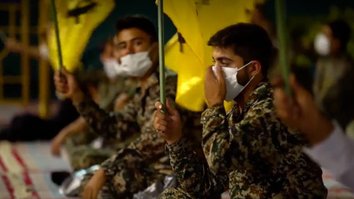IRAN -- Iran's Fatemiyoun Division, a militia backed by Iran's Islamic Revolutionary Guard Corps (IRGC) and comprised of Shia Afghan recruits, has been exploiting the children of fallen members as part of a recruitment drive.
Over the past few months, the militia has posted online dozens of photos of such children taking part in ostentatious ceremonies, commemorating the thousands killed fighting for Tehran's interests in Syria.
These public displays of mourning for dead Fatemiyoun soldiers are part of a calculated strategy on part of the IRGC and of Iranian leaders. They seek to lure and exploit more Afghans, Pakistanis and other Shia from around the Islamic world to fight for and to advance Tehran's subversive agenda in the region.
Hiding behind the facade are Iran's coercive recruitment techniques, which include false promises of money and of Iranian residency permits. Instead, however, IRGC officials often threaten desperate Afghan refugees with deportation to Afghanistan if they refuse to fight.
![Family members of deceased Fatemiyoun fighters attend Eid ul Ghadir celebrations on August 31 in Safadasht, Tehran Province. [File]](/cnmi_st/images/2018/10/04/14708-photo_2018-585_329.jpg)
Family members of deceased Fatemiyoun fighters attend Eid ul Ghadir celebrations on August 31 in Safadasht, Tehran Province. [File]
The staged ceremonies also make a public show of Iranian support for those who fight and die in Syria and elsewhere, but IRGC's assistance often stops with Tehran-paid funeral rites as the nation continues to suffer serious economic problems.
Such events do make one matter clear: Afghans fighting for Iran are dying in Syria, leaving their children fatherless and without support.

![A child of a dead Fatemiyoun fighter attends a parade marking Sacred Defence Week September 23 in Kashan District, Isfahan Province, Iran. [File]](/cnmi_st/images/2018/10/04/14710-4-01-04-585_329.jpg)
![Pro-Fatemiyoun groups host an event on August 31 in Mashhad, Iran, celebrating the September and August birthdays of several children who have lost their fathers in the war in Syria. [File]](/cnmi_st/images/2018/10/04/14707-31-585_329.jpg)
![A child holds a picture of his father at a religious ceremony in Mashhad, Iran, September 20. His father was reportedly killed in Syria while fighting as part of the Fatemiyoun Division. [File]](/cnmi_st/images/2018/10/04/14709-135-585_329.jpg)
![A child attends a Fatemiyoun-backed parade marking Sacred Defence Week September 23 in Kashan District, Isfahan Province, Iran. [File]](/cnmi_st/images/2018/10/04/14711-photo_2018-09-26_14-00-53-585_329.jpg)
![Family members of two slain Fatemiyoun fighters attend a birthday celebration for the deceased in Arak, Iran, July 26. [File]](/cnmi_st/images/2018/10/04/14715-9-26_14-22-46-585_329.jpg)
![Seyyed Ebrahim Raisol-Sadati, commonly known as Ebrahim Raisi and the custodian and chairman of the Iranian charity Astan Quds Razavi, September 20 in Mashhad, Iran, meets with a number of children whose fathers were killed in Syria fighting for the Fatemiyoun Division. [File]](/cnmi_st/images/2018/10/04/14796-21_04-42-03-585_329.jpg)
![Pro-Fatemiyoun groups host an event on August 31 in Mashhad, Iran, celebrating the July birthdays of several children who have lost their fathers in the war in Syria. [File]](/cnmi_st/images/2018/10/04/14809-6-585_329.jpg)
![Pro-Fatemiyoun groups host an event on August 11 in Mashhad, Iran, celebrating July birthdays of several children who have lost their fathers in the war in Syria. [File]](/cnmi_st/images/2018/10/04/14828-photo_2018-09-26_14-04-46-585_329.jpg)
!["I want to be 'martyred' like my dad," Ailyas [right] reportedly said via Iranian media. Ailyas is the son of an Afghan citizen who died in Syria in 2015 fighting for the Fatemiyoun Division, according to the group. [File]](/cnmi_st/images/2018/10/04/14829-photo_2018-06-14_02-20-20__2_-585_329.jpg)







What a shame! Instead of fighting ISIS groups in Afghanistan, they are fighting there on behalf of, and for the interests of, a country that has always had ill wishes for for Afghan people. Shame on you ignorant people who consider no value for your own lives or properties! They are taking advantage of you and your families.
Reply4 Comment
The situation is very bad
Reply4 Comment
Alas, for this heedless people! As for those who participate in Syrian war, you are not Afghans. What did ISIS do to you in Dasht-e Barchi?
Reply4 Comment
Afghan government should seriously ask Iran to return the Afghans based in Iran with dignity. Also, Afghans should build their country themselves. Hafizullah Hoshmand Kabul province
Reply4 Comment